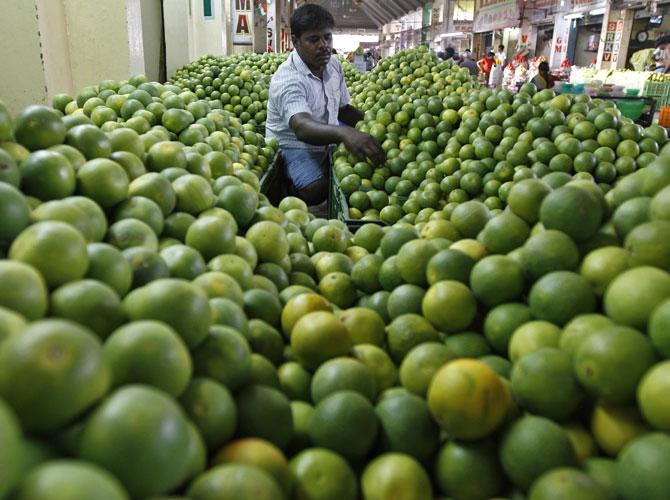
'The real contributors of labour, of skill and even technological input, all come from this (96 per cent) category and I love them. No communal riots, least of caste-ism in these communities.
There is more humanity, more democracy in these classes, these communities,' says social activist Medha Patkar, bottom, left, in a special series where various Indians tell Rediff.com what they love the most about India.
I love India. Not only because it is my country. But because of its bountiful eco-system. (It is not) just a politico-economic system. (It is) full of -- not just -- the natural resources which you can commodify or harness, but those that you can breathe and help people survive and live with joy and happiness.
Those include the rivers. Those include agriculture, the culture associated with land. And also the biodiversity. The crop diversity. As well as the hills, the mountains, from the Himalayas to the Satpuras…
People in India are more natural resource-based than (elsewhere). First of all, a majority of the people are in agriculture or living (off) various arts and artisanship, which comes from nature. So they are not basically the destroyers, the exploiters or the extractors of the resources. This also goes along with the hard work and the human (resource) investments, which the people do willingly.
This has been a long culture, a generations-old culture, starting with the Narmada valley (where I am at this moment, which is the oldest of the civilisations in the world) and it ranges to all the river valleys. Not just the river valleys, every field and the seashore, as well.
From the coast to the plains, a large majority of the population live on human resources and natural resources. That’s what I love and value the most. This is sustainable. Sustainability does not come by destroying the forest, destroying the eco-culture and then trying to plant some mono culture or trying to claim you would recover the losses... Basically in our (culture) it is the simplicity and self-reliance that go with sustainability.
That’s Indian culture.
Certainly money and market have made an impact/dent; no doubt about it. Globalisation and liberalisation have brought in the worst changes. Yet (this) culture and the eco-economical roots still persist.
The culture of condemning those who are considered poor – they are considered to be backward also. But they are the forward-looking population, I would say, because they look forward to the next generation for whom the resources are to be saved -- and not destroyed.
These kinds of communities include the urban poor communities also. They do not have the natural resources of the kind that even the Dalits on the periphery of rural India have and certainly not the rich-resource matrix which the tribal Adivasi population own or possess even today. Even the urban poor are the investors of human resources. That’s a class in itself. And they have their roots in the rural areas.
Most of the slums in the metropolises-megapolises, like Mumbai, are a kind of rural-urban pockets. There is something reflected from the rural culture – hard-working, self-reliant etc. No doubt there is a difference, but there is also some kind of a minimum common denominator.
It is very necessary to look at all the 96 percent workers (of India) considered as the unorganised sector workers. I hate that word because they are more organised than the so-called organised sector -- banking, insurance, as well as the other sectors.
They are basically the unprotected class of workers. This category includes potters, fish workers, agriculturalists, even owner-cultivators, agricultural labourers, hawkers, artisans, forest-dwelling Adivasis etc. All of them (need to be) seen together. They include urban labourers as well.
What I love about urban India is this category of population that built cities, run cities, clean cities, drive cities, that produce everything that is produced in any city.
No one else does that. A builder doesn’t build a building. It is the construction worker. The manager or owner of a factory doesn’t produce anything. They are only investors of money – and notes are manufactured (wealth).
The real contributors of labour, of skill and even the technological input, all come from this (96 per cent) category and I love them. No communal riots, least of caste-ism in these communities. They are so self-reliant. They build their houses. They dig their water from wherever they are asked to. They pull their own electricity and start their own meters.
The rich all have a parasitic existence.
This is real India. This is real humanity as well. There is more of democracy in these classes, these communities…
I think across the country -- and across the world -- this class exists and differs from those who live on money and market -- they are exploiters, myself included, those who cannot have a self-reliant life and those who exploit resources and human resources more.
This (self-reliant) character is not only restricted to Indians. It is across the world. I have seen Brazilians. I have seen Africans. The other Asians. Even among river valley civilisations there is so much commonality from the Amazon, to the Mekong to the Narmada and Kalbagh and Mangla (Dams) in Pakistan, or Yangtze in China. There is commonality of a kind.
But I think you still love your own country, because it is your own.
 Medha Patkar is a social activist and eco-crusader. She is recognised for her role in the Narmada Bachao Andolan, a grassroots organisation against building large dams.
Medha Patkar is a social activist and eco-crusader. She is recognised for her role in the Narmada Bachao Andolan, a grassroots organisation against building large dams.
Patkar was travelling on a train in the Narmada river valley when Vaihayasi Pande Daniel caught up with her.